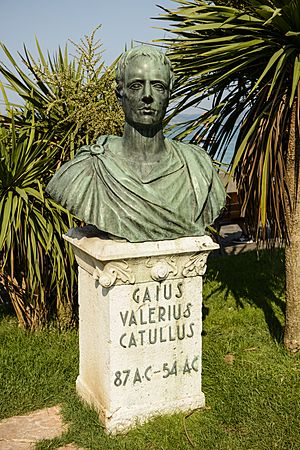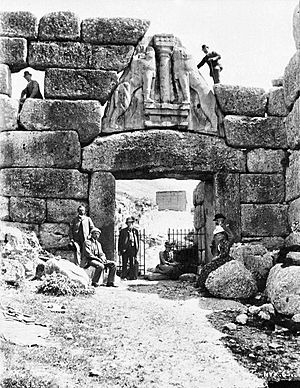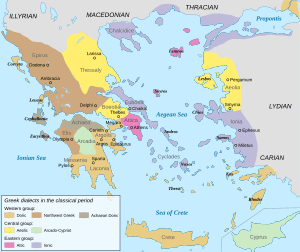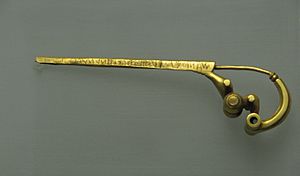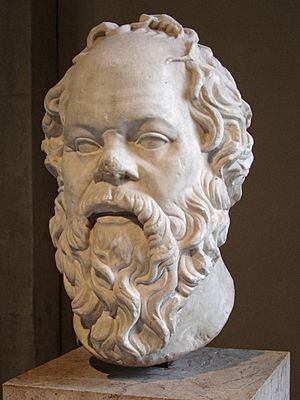Classics facts for kids
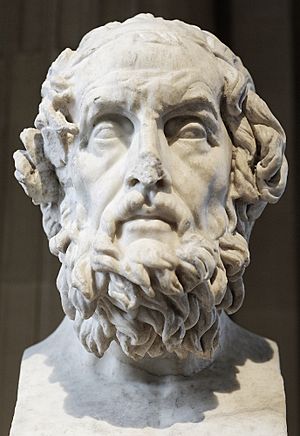
Classics or Classical Studies is a field of study that explores the ancient Greco-Roman world. This includes learning about their languages, like Ancient Greek and Latin, and their amazing stories, poems, and plays. It also covers their ideas about life (philosophy), their history, and finding out about their past through archaeology. For a long time, especially in Western countries, studying the Classics was seen as a really important part of a good education. It helped people understand the foundations of many ideas we have today.
Contents
What Does "Classics" Mean?
The word Classics comes from the Latin word classicus. This word originally meant "belonging to the highest class of citizens" in ancient Rome. Later, around the 2nd century AD, people started using it to describe writers and artists who were considered the very best and most important.
A Look Back: The History of Classics
Middle Ages: Learning from the Past
During the Middle Ages, studying Classics was very important for education. Students learned by copying and understanding old Greek and Roman works. Latin was the main language used for learning and important writings.
Renaissance: A New Interest
The Renaissance (a period of rebirth in Europe starting in the 14th century) brought a fresh interest in ancient literature and history. People started to study and appreciate the old Greek and Roman ways of thinking and writing even more. This period saw the rise of Renaissance Humanism, which was a movement that encouraged studying and imitating the wisdom of ancient times.
Neoclassicism: Copying the Ancients
In the late 1600s and 1700s, writers and artists in Western Europe really admired classical styles. They tried to copy the ancient Greek and Roman models in their own works. For example, even plays by William Shakespeare were rewritten to fit these classical ideas during this time!
19th Century: Changes and Growth
As the 19th century went on, the influence of classical studies started to change, especially in the United States. Some people thought it was too focused on a small group of people. However, the field of Classics itself grew a lot. It started to include ancient history and classical archaeology as important parts of the study, not just separate subjects.
20th Century to Today: Less Common, Still Important
In the 20th century, studying Classics became less common in schools and universities. For example, famous universities like Oxford and Cambridge in England stopped requiring students to know Greek in 1920 and Latin in the late 1950s. By 2003, only about 10% of public schools in Britain offered any classical subjects. Even though it's less common, Classics is still a valuable field that helps us understand where many of our modern ideas come from.
What Do Classicists Study?
Today, the study of Classics is very broad. While it traditionally focused on ancient Greece and Rome, it now includes the entire ancient Mediterranean world. This means it also covers parts of Northern Africa and the Middle East.
Philology: Understanding Ancient Words

Classical philology is the study of ancient languages, especially Latin and Greek, as they appear in old writings. Scholars in this area work to understand texts from the classical period.
Archaeology: Digging Up the Past
Classical archaeology is the oldest type of archaeology. It involves digging up and studying ancient sites to learn about the people who lived there. It became a key part of classical studies in the late 1800s.
Art History: Ancient Art and Buildings
Some art historians focus on the art and architecture of the classical world. The art and buildings from ancient Rome and Greece are still highly admired. They have greatly influenced much of the art and architecture we see today.
Ancient History: Stories of Old Civilizations
Along with philology, archaeology, and art history, scholars study the history and culture of ancient civilizations. They work to create a continuous story of the Ancient World and its people.
Philosophy: Love of Wisdom
The word "philosophy" comes from the Greek word philosophia, which means "love of wisdom." Many of our ideas about philosophy today started with the ancient Greeks. Ancient Greek philosophy explored many topics, including how societies should be run, how to live a good life, and the nature of reality.
Classical Greece: A Foundation for the West
Ancient Greece refers to the Greek civilization from about the 8th century BC until the Roman conquest of Greece. The Classical period, in the 5th and 4th centuries BC, is often seen as the peak of Greek civilization. This period began with the Greco-Persian wars and ended with the death of Alexander the Great.
Classical Greek culture had a huge impact on the Roman Empire. The Romans then spread many Greek ideas across the Mediterranean region and Europe. Because of this, Classical Greece is often considered the main culture that laid the groundwork for Western civilization.
Language: Ancient Greek's Influence
Ancient Greek was the language used by famous Athenian historians, playwrights, and philosophers. It has given many words to English and other European languages. It has been a standard subject in Western schools since the Renaissance. Many scientific names for plants and animals, and other scientific terms, use Latinized forms of Ancient Greek words.
Literature: Epic Tales and Early Writing
The oldest surviving Greek stories are epic poetry, probably written around the 8th century BC. These early epics were first told orally, without writing. Around the same time, the Greek alphabet was created. The earliest writings we have found are from about 750 BC.
Mythology and Religion: Gods, Heroes, and Legends
Greek mythology is a collection of myths and legends about the ancient Greek gods and heroes. It also explains their ideas about the world, its origins, and their religious practices. These myths were a big part of ancient Greek religion. Today, scholars study these myths to understand the religious and political life of Ancient Greece and how myths are created.
Philosophy: Thinking Deeply
The earliest surviving philosophy from ancient Greece dates back to the 6th century BC. Greek philosophers thought about many different subjects. These included how governments should work, how to live a good life, the nature of reality, and how we think logically. They also studied things we now call biology and public speaking.
Images for kids
See also
 In Spanish: Estudios clásicos para niños
In Spanish: Estudios clásicos para niños


